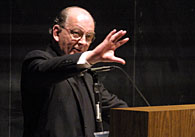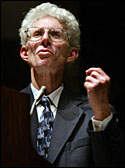Two views on religion in liberal democracy
Two views on religion in liberal democracy McGill University
User Tools (skip):
Two views on religion in liberal democracy
"There is a long and still influential tradition that pits liberal democracy against acts of faith," charged Richard John Neuhaus at the top of his October 10 Beatty Lecture on the place of religion in liberal society.
 Richard John Neuhaus
Richard John NeuhausPHOTO: Owen Egan |
|
Fighting words? It would seem so, coming as they did from a neoconservative Catholic priest speaking one night after liberal pundit William Galston delivered another Beatty Lecture on the same general subject.
The speakers certainly fit the role of rhetorical adversaries. Galston, director of the Institute for Philosophy and Public Policy and former domestic policy advisor to President Clinton, was the spry intellectual, right down to the prominant round glasses. Neuhaus, president of the Institute on Religion and Public Life and editor-in-chief of the journal First Things, was every bit the spiritual populist, orating in muscular baritone.
What emerged, though, was a "discussion of important nuances," said Douglas Farrow, associate professor of Christian thought at McGill and co-chair of the well-attended Pluralism, Religion & Public Policy Conference, which sponsored the lectures.
If they live in different camps, Galston and Neuhaus set forth from common ground--agreement on the virtues of liberal democracy, its compatibility with religious faith, and the consistency of its basic underlying principles being rooted in the Judeo-Christian tradition. From this confluence they diverged, Galston into the limits of liberal democracy's authority, and Neuhaus into the role of transcendent truth in the creation and maintenance of the liberal democratic state.
Early in his lecture, "Religion and Liberal Society," Galston introduced the concept of political pluralism as the antidote to the popular modern notion of the state as all-powerful and civil society as a political construction.
"Political pluralism understands human life as existing in a multiplicity of spheres, some overlapping. Each sphere enjoys a limited, but nonetheless real, autonomy," he explained. "Political pluralism respects these diverse spheres of human activity; it does not understand itself as creating or constituting those activities."
For example, families are shaped by public law. But they are not a public construction.
Galston proposed that a pluralist liberal democracy must create an environment in which individuals and groups can freely pursue their distinctive visions of what is really important. "There is a presumption in favour of a free exercise of this kind of individual and group activity," he continued. "And a liberal democratic state run pluralistically bears--and must discharge--a significant burden of proof whenever it seeks to restrict this activity."
This is especially important in cases of religion, a vulnerable institution in an all-powerful state. "In some circumstances, the requirements of faith may stand in contention or even in opposition to civic law."
To illustrate, Galston cited a landmark 1943 United States Supreme Court decision that overruled any law compelling a person to salute or pledge allegiance to the American flag if the practice runs counter to his conscience. But what is conscience? Galston turned to the court decision as delivered by Justice Robert Jackson: "If there is any fixed star in our constitutional constellation, it is that no official, high or petty, can prescribe what shall be orthodox in politics, nationalism, religion or other matters of opinion."
 William Galston
William GalstonPHOTO: Andrew Dobrowolskyj |
|
"In modern times," Galston said, "individuals or groups who are not, strictly speaking, religious come to experience ensemble beliefs and actions that share these core features of religious institutions. It does not seem to me an abuse of speech to apply the term 'conscience' to this experience, whether religious or otherwise."
The ideal form of liberalism, he concluded, is bound to respect and protect this kind of individual conscience. "Liberal democracy, rightly understood, denies the state plenipotentiary power and relies instead on the idea of political pluralism," Galston added. "That is the conviction that legitimate authority is multiple rather than singular. And no one locus of authority, secular or religious, individual or collaborative, enjoys a comprehensive priority over the rest."
Speaking the next evening on "Liberal Democracy and Acts of Faith," Neuhaus continued the defense of liberal democracy, "rightly understood." But his right understanding was not the same as Galston's.
Neuhaus argued that a deep chasm has opened between two liberalisms: One, embodied in the Civil Rights movement, is "a liberalism inclusive of the vulnerable and driven by a transcendent order of justice." The second, the first's mutation, triggered by the movement for broader abortion laws, is "exclusive and recognizing no law higher than the will of the autonomous, unencumbered self."
Neuhaus acknowledged the idea of the individual as the great achievement of modernity and its liberal tradition, but argued that the notion has been misunderstood. "The problem with the contemporary distortion of the individual as the autonomous, unencumbered and sovereign self is not that it's wrong about the awesome dignity of the individual," he said, "but that it cuts the self off from the only way of explaining why the person possesses such dignity."
This source, he argued, can only be found in transcendent, religious truth. By extension, a state that charges itself with the protection of individual dignity cannot be truly secular or neutral to religious truths. Neuhaus pointed out that the Declaration of Independence, the archetypal document of liberal democracy, declares "self-evident truths" that ground such freedom and direct it to the transcendent ends of "Nature and Nature's God."
"The theistic references of the Declaration are not, as some contemporary commentators claim, simply crowd-pleasing asides but are integral to the moral argument of the document--and the Declaration is, above all, a moral argument," he said.
But if liberal democracy, as Neuhaus sees it, must be a moral endeavor, he claimed morality's sway in the political arena is diminishing. The reason, he said, can be found in the crux paragraph of Centesimus Annus, the 1991 encyclical of Pope John Paul II: "Nowadays there is a tendency to claim that agnosticism and skeptical relativism are the philosophy and basic attitude which correspond to democratic forms of political life. Those who are convinced that they know the truth and who firmly adhere to it are considered unreliable from a democratic point of view since they do not accept that the truth is determined by the majority, or that it is subject to variation according to different political trends. It must be observed, in this regard, that if there is no ultimate truth to guide and direct political activity, then ideas and convictions can easily be manipulated for reasons of power. And, as history demonstrates, a democracy without values easily turns into open or thinly disguised totalitarianism."
Neuhaus continued, "The importance of this paragraph in its pertinence to our North American situation can hardly be overestimated. The dogmatic insistence upon agnosticism in public discourse and decision making has created, as much as it can be created, a naked public square," referring to his own book discussing a lack of shared religious or moral values in American public debate.
But if this is the case, he added, it's the fault of citizens who hold transcendent truths. "When we survey the deprivations and ravages of our social, political and religious circumstance, it is tempting to look for someone or something to blame. It is easy to say 'liberalism made us do it,'" he said. "But liberalism is freedom. And what we do with freedom is charged to our accounts."

